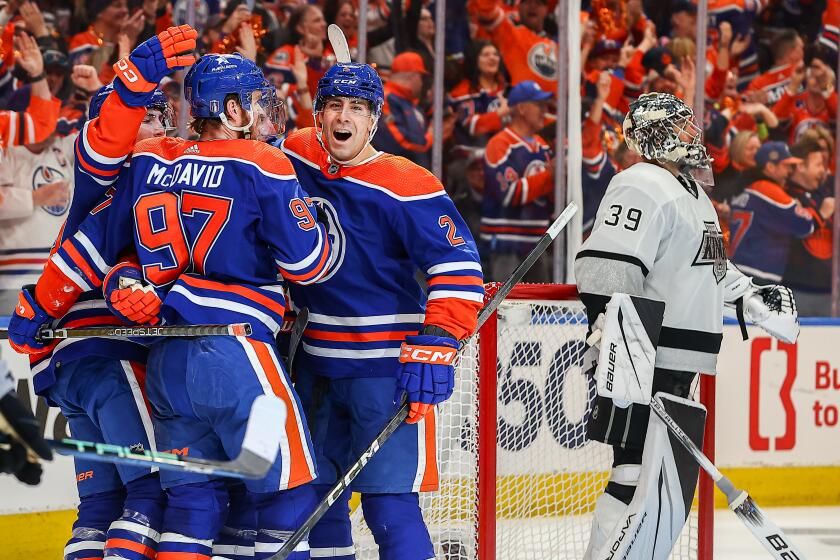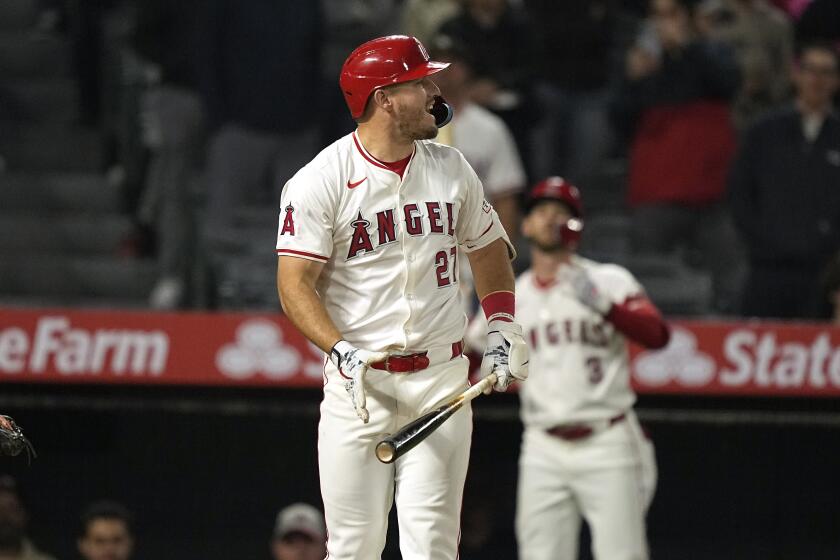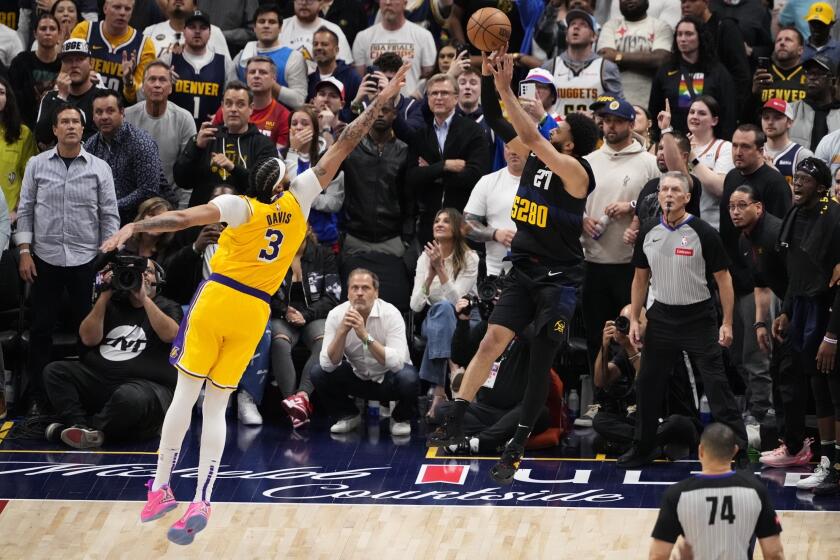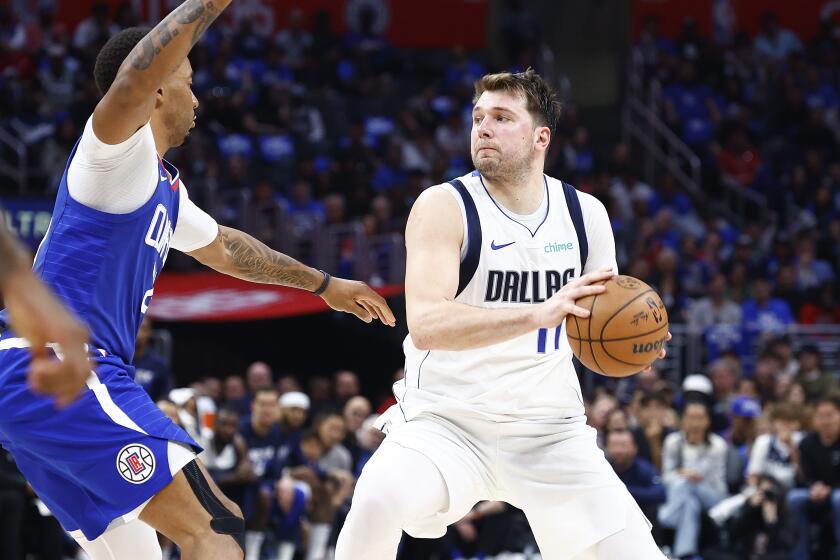NBA treads lightly but significantly into world of legalized gambling
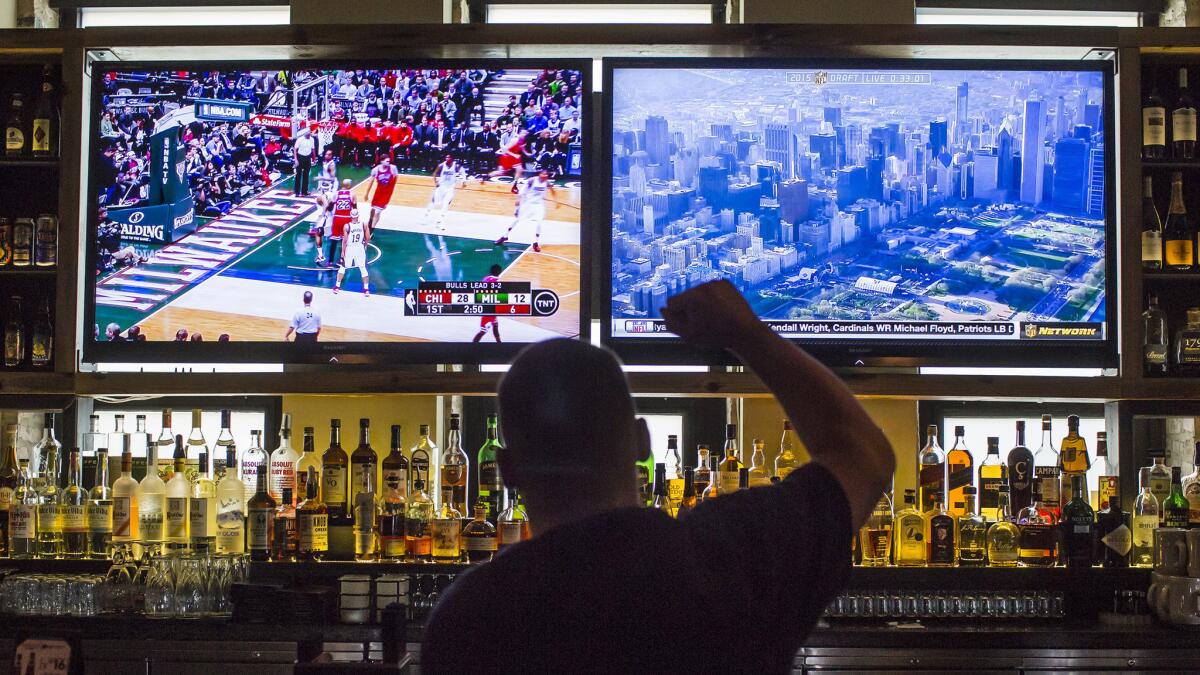
A patron of The Ogden in Chicago watches an April 30 playoff game between the
Nothing about the man in the dark suit suggested he felt uncomfortable or out of place.
As a top attorney for the NBA, Dan Spillane took his seat on the dais and faced an unlikely audience — a convention of gambling industry executives.
“We have a lot to learn,” he said.
It was just last fall Spillane’s boss, Commissioner Adam Silver, surprised the sports world by coming out in support of legalized betting on games nationwide.
The NBA, NFL, NHL and Major League Baseball stand to make millions by partnering with casinos and online wagering sites. As the buzz from Silver’s announcement subsides, tough questions remain.
Pro sports in America have traditionally held gambling at arm’s length, in large part because of costly point-shaving scandals. Industry consultant Marc Ganis of Sportscorp Ltd. suggests any future affiliation with gaming “has the potential to kill the golden goose.”
That raises a reasonable doubt about whether the other three leagues will join in Silver’s campaign. And no one seems to know when or whether Congress will act on the issue.
Speaking at the recent GiGse convention for Internet gaming, Spillane preached patience.
“We’re at the beginning of what I think is a long process,” he said. “But you have to start somewhere.”
In his New York Times’ op-ed piece last November, Silver focused on offering a palatable alternative to the shadowy world of bookies and offshore betting sites.
“It is a thriving underground business that operates free from regulation or oversight,” he wrote, adding: “There is an obvious appetite among sports fans for a safe and legal way to wager.”
Spillane agreed but acknowledged legalization “would probably be good for business too.”
Nevada casinos handle an estimated $3.9 billion in sports wagers annually, a substantial figure that pales in comparison to the estimated $80 billion to $380 billion that Americans bet each year through unregulated channels.
By continuing to distance themselves from gambling, the leagues are “leaving a lot of money on the table,” said Brad Humphreys, an associate economics professor at West Virginia University. “Profit-maximizing businesses don’t do that.”
Legalization would open new revenue streams by way of sponsorship and advertising deals with the gaming industry. It might also help build a more loyal customer base.
Simply, people care more about sports when they have money riding on the outcome. A $20 wager might get a Massachusetts fan to watch an otherwise insignificant NBA game between the Utah Jazz and the Sacramento Kings.
Viewership becomes essential with leagues operating their own networks and selling broadcast packages on cable television. Rodney Paul, a sport management professor at Syracuse University, said: “You want anything that keeps those games interesting.”
But this potential benefit carries an equally sizable risk.
It took baseball years to recover from the Black Sox Scandal in which players on the Chicago White Sox threw the 1919 World Series. The NBA faced a similar crisis in 2007 when referee Tim Donaghy pleaded guilty to selling inside information to gamblers.
“There’s a lot of negative precedence,” said Adam Krejcik, of Eilers Research. “To overcome that perception takes time.”
Current federal law limits sports betting to Nevada, Delaware, Montana and Oregon, with Nevada the only state to offer extensive wagering. League attorneys have fought efforts by other states — most recently New Jersey — to join that list.
Even the NBA has expressed misgivings about piecemeal legalization, saying it prefers the added security of federal regulation.
The gambling industry insists that, if given the chance on a national scale, it could help guard against scandal by watching for unusual betting patterns. NHL Commissioner Gary Bettman offers another reason for his opposition to legalized sports betting.
“My concern is focused on the message it sends,” he said, “particularly to the young people.”
So why would anyone expect change?
Researchers see a shift in cultural attitudes nationwide. The transformation began with office pools that blossomed around the NCAA men’s basketball tournament. People who did not know a zone defense from a high pick began throwing a few dollars — or more — into the pot and filling out their March Madness brackets.
Next came fantasy leagues in which people drafted real players onto make-believe teams and scored points based on how those athletes performed in games.
Now, fantasy sports have morphed into online contests that offer daily cash prizes. The federal government considers them games of skill and therefore legal, but they are banned in five states.
“They’ve blurred the line between fantasy and betting,” Humphreys said. “And, as a society, we’ve become more comfortable with that.”
The NBA, NHL and MLB have entered into business agreements with sites such as FanDuel and DraftKings. So have individual NFL teams, including the New England Patriots and Washington Redskins.
The NFL has also pursued expansion into the British market, where fans can bet at kiosks inside the stadium or on their smartphones.
Pro football is key — as the largest, most successful league, it will ultimately control the discussion. And its owners, sitting on billions in TV revenue, can afford to be cautious.
So when the gambling executives at the San Francisco convention asked Spillane for a prediction on when significant change might occur, he advised them to think in terms of years, not months.
The NBA’s new stance on sports betting — for all the hype it generated — represents merely a first step.
“The whole point of that was to start a conversation,” Spillane said. “That has happened and I think it will continue.”
Follow David Wharton on Twitter @LATimesWharton
More to Read
Get our high school sports newsletter
Prep Rally is devoted to the SoCal high school sports experience, bringing you scores, stories and a behind-the-scenes look at what makes prep sports so popular.
You may occasionally receive promotional content from the Los Angeles Times.




